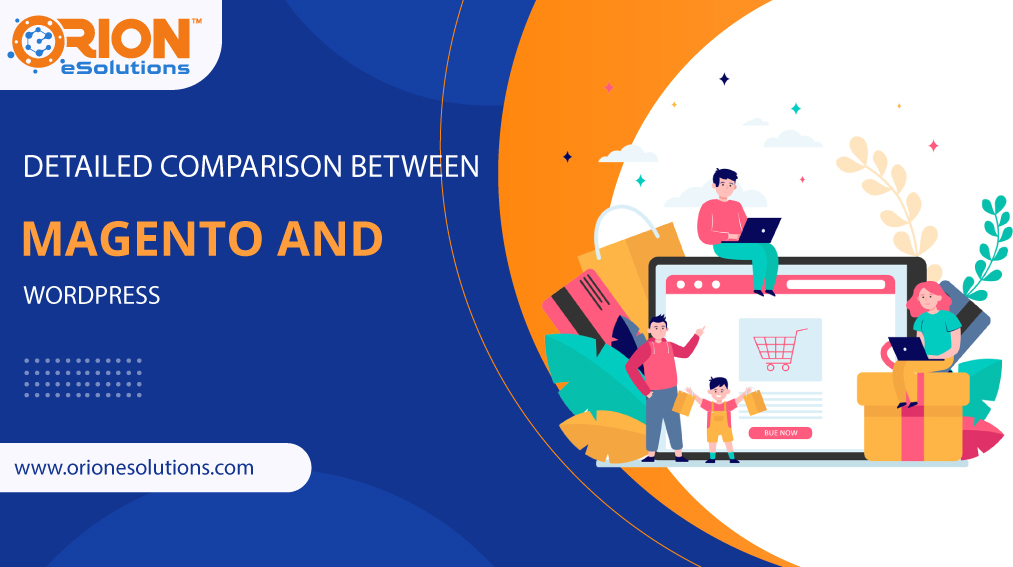In case you ever worked even a little on starting your own e-commerce website then you must be aware of the importance and hassles of this task. One of the biggest questions is of choosing the right platform for website development. A dedicated eCommerce content management system can be very useful for running an online store but it can also be pretty expensive.
There are multiple platforms that can be used for building an online store. Fortunately, there are two very good open-source and robust options that are available for use. These two options are Magento and WordPress.
Magento is a highly functional platform that is used widely for building an online store from the very beginning. WordPress is a regular content management system but it has the functionality to be extendable with dedicated plugins which can be utilized to transform it into a large scale eCommerce management system.
In this article, we will compare the features and the complexities of Magento and WordPress. Although both platforms are unique in their own ways if you’re on the fence deciding which platform is the best then this comparison will be very helpful for you. Keep reading to know more about the details of both these platforms.
WORDPRESS

WordPress is a completely free and open-source blogging platform. It is exceptionally user-friendly and it is popular for offering an easy to embed plugin architecture.
Anyone can download the latest edition and upload the files to their servers in case they wish to start their own version of content-rich blogging or websites. There is an extremely large community of WordPress which means that there are many plugins that can be added to the site.
Right from adding a forum to turning the site into a social network and using eCommerce plugins to sell online, WordPress can be used for doing many things. It has millions of active websites with billions of pages, new posts, views, and comments being created and posted every month.
Some of the most popular websites that have been built using WordPress are TechCrunch.com, NewYorker.com, etc.
MAGENTO

Magento is considered to be a dedicated eCommerce platform. It is free and open-source. The community version of this platform can be downloaded and installed easily on the server in case someone needs to build an online store. It has multiple features including many advanced eCommerce features like product comparisons, multi-store management, multiple accounts system, etc.
This platform can be used to offer the advantages of a single page checkout and quick social logins to the customers. Each detail that goes into the online store gets included in the core Magento which is available in the marketplace.
Magento also offers a high level of custom made facilities and various other functionalities which can be very useful in building a good eCommerce website. These functions are to provide the merchants with the flexibility to set up an online store based on their specific business needs. Features like multi-store management, mobile eCommerce, search engine optimization, report generating, and other vital management tools make Magento extremely helpful.
SIMILARITIES BETWEEN MAGENTO AND WORDPRESS
Magento and WordPress are open-source platforms that have the functionality to provide customers with the benefits of being free and open source. Both of these platforms allow the facility to incorporate many e-commerce functionalities that can be used for boosting the growth of an online store. In addition to this, the blogging facilities on both of them are amazing for the growth of business on the digital platform.
Both Magento and WordPress offer many interesting themes, features, and other options that can be used to customize the e-commerce websites and search engine optimization. In case you are a beginner then using these platforms can be of great assistance in creating an e-Commerce website with tutorials.
Therefore, when it comes to the similarities between the two platforms, both of them are architecturally similar, customizable, SEO friendly, can be broadly themed and have a very strong online support. Being great options for content management systems, these platforms allow the users to add, modify, and manage the content in a simple and effective way.
DIFFERENCES BETWEEN MAGENTO AND WORDPRESS
Coming to the differences between the two platforms, which one out of Magento or WordPress is more suitable depends strictly on the primary goals of a business. In case the main goal of a business is to build online sales then Magento can be a great option. However, in case the goal of a business is just centered on content marketing and consistent publishing then WordPress can be a relatively strong option.
Hence, it must be understood that both of these platforms are entirely different and equally in their own significant ways. The final choice must depend on how many products do you plan to sell online and what is the main focus of your website.
Let’s start understanding the main differences between them one by one:
- SECURITY: When we talk about security, Magento is ahead of WordPress. This is because Magento is a dedicated eCommerce platform with multiple built-in features. Any online eCommerce store that is built with Magento needs no extensions or plugins. In contrast to this, WordPress needs some plugins in order to add any kind of extra functionality. In case you wish to turn a WordPress website into an online store then there will be a need for a good quality eCommerce plugin to be able to do the same. The greater the number of third party plugins one uses, the higher is the risk of adding an insecure code to the website. WordPress demands the plugins to be kept safely by the users. Unfortunately, there are times when this does not happen as quickly as it must. Additionally, many times a mistake made by the plugin developers can lead to security being vulnerable. Since better security only prevails because of fewer plugins, themes, and add-ons, Magento wins undoubtedly. Also, being an eCommerce dedicated website, Magento can be used to include the latest techniques for keeping online stores safe.
- FLEXIBILITY: The problem of flexibility is entirely opposite to that of security. In this case, WordPress comes out as being ahead as its main focus on facilitating highly efficient content publishing processes. This focus on eCommerce means that it is not easily used for any additional purposes. A WordPress website can be quickly extended with a few plugins to become a social network, a forum, or a well-coordinated online store. In contrast to this, a Magento website is majorly created to facilitate eCommerce processes and nothing more than that. This feature of Magento is a pro while we assess the security factors but a con when we assess the flexibility factors. Although the main code of Magento will always be focused on the eCommerce features only, there is an option to add a blog to the Magento website with the help of an extension. Keeping the downside of using many plugins and extensions in mind, it is much easier to use WordPress for building different kinds of websites. Therefore, it winds in this category.
- SEARCH ENGINE OPTIMIZATION (SEO):

Source – Google
Both Magento and WordPress websites can be used to perform good functions in the search engine results in case they are correctly configured and optimized with time. SEO is a detailed task these days because it includes monitoring many aspects of a website that can either enhance or hinder the performance of a website.
If a website is enriched with high-quality content then the search rankings get improved instantly. Therefore, a Magento based website that has many well-described products could perform with respect to SEO. With that being said, there will always be a need to be careful about the thin or duplicate pages as the URL parameters could give a false impression to the search engines. Just like this, a WordPress website with a few products but a large and popular blog could also perform well if the right pages and URL parameters are monitored correctly. Irrespective of whether you use WordPress or Magento, there will always be a strong need to deal with SEO or including a specialist who is capable of ensuring good SEO results. Magento and WordPress have great potential to do really well in terms of SEO because they come with acceptable features that can further be improved by adding certain plugins. - BUDGET: The budget is primarily concerned with the requirements for the online eCommerce store. Although both Magento and WordPress are free and open-source, building a good eCommerce website can still entail some extra costs. In case you already have some expertise in dealing with WordPress and you want to sell a limited number of products then you can easily set up the online store all by yourself.
However, in case someday the number of products that you want to sell increases to let’s say 70-100 products then there will be a need to switch to a platform like Magento. If you think that your product size might increase down the line then it will be smart to choose Magento right away. Additionally, the feature-rich core and security of Magento could also mean fewer costs in the long run. - USER FRIENDLINESS: It is relatively tough to declare just one winner while comparing Magento and WordPress. In case you already have some experience with WordPress then it will be easier to implement an eCommerce plugin rather than learning about Magento from scratch.
However, in case you have decided to outsource the development of your online store then a professional team of developers will be able to assist amazingly well to suit your needs. Things like easy organizing and updates, integration and turning special offers on or off, etc. can be easily handled by developers. There will be an initial learning period needed for each platform. If you want to sell more than 20 products then Magento will be easier to manage in the long term. In contrast to this, in case you wish to sell only a limited number of products then it will be easy to customize a WordPress website with a high-quality eCommerce plugin. - GROWTH:

Source – Google As it has been mentioned many times until now, Magento is right in case you want to create an online store containing many products. In case you create your online eCommerce store with WordPress then you will be managing many plugins that are built by many developers and might conflict with each other. There will be a need to stay aware of all the plugin updates. Sometimes there is also a possibility that a developer might stop working on a plugin which could mean finding a replacement that does not conflict with other plugins. Additionally, with time a WordPress site can become difficult to maintain a patchwork of code.
In case you do not plan to add more products but just a blog then WordPress can prove to be a great option for growth. It is one of the best content publishing platforms having many built-in features. Therefore, in case you are focused more on content than products then avoid creating a patchwork of code by only using the main features of WordPress.
CONCLUSION
Considering all the similarities and differences between Magento and WordPress, you must have figured out the main features that make these stand out in their own significant ways.
A professional Magento developer or a WordPress developer will be able to help best and work according to whatever your needs might be. If you are just starting out with your company then it will be wise to make a plan and focus either on sales or on content marketing. On the other hand, if you have a big company then you can also use the functionalities of both these platforms in tandem.
This can be done with the support and consistent assistance of an experienced developer only because only a professional to make the best of all the benefits being offered by both these platforms.
Also Read: WHAT ARE THE MAJOR PROS AND CONS OF USING MAGENTO?











